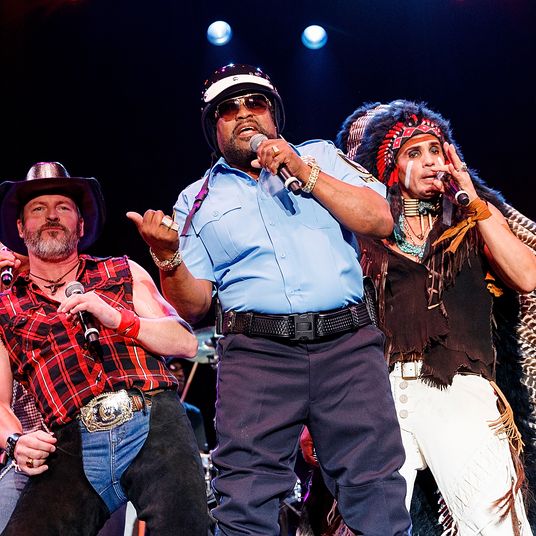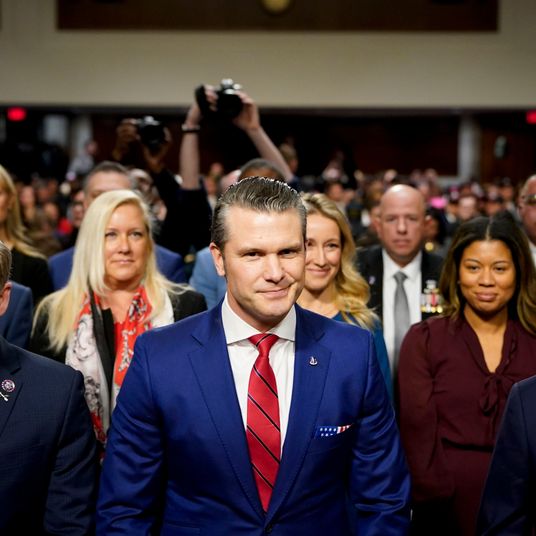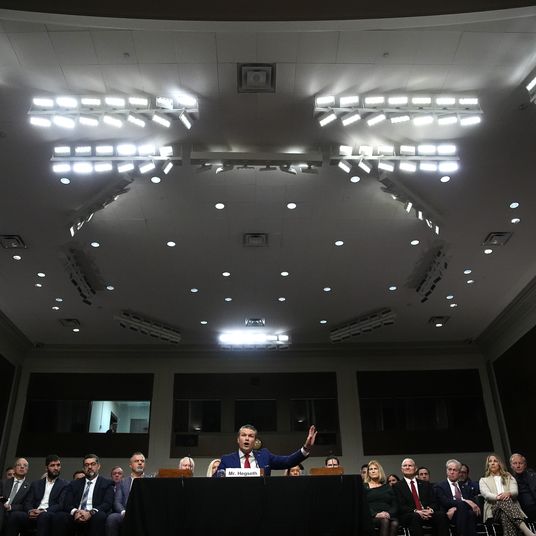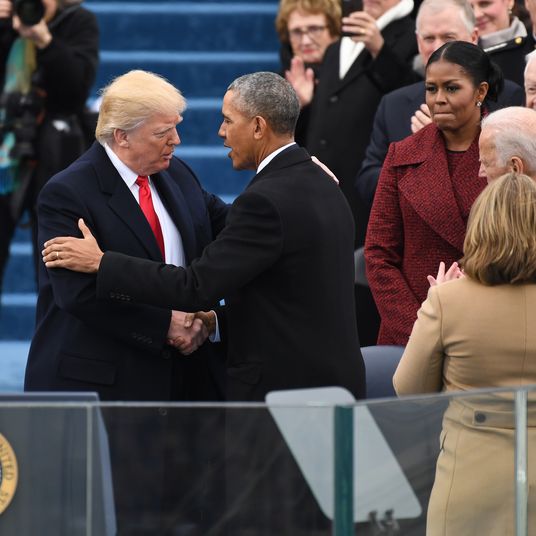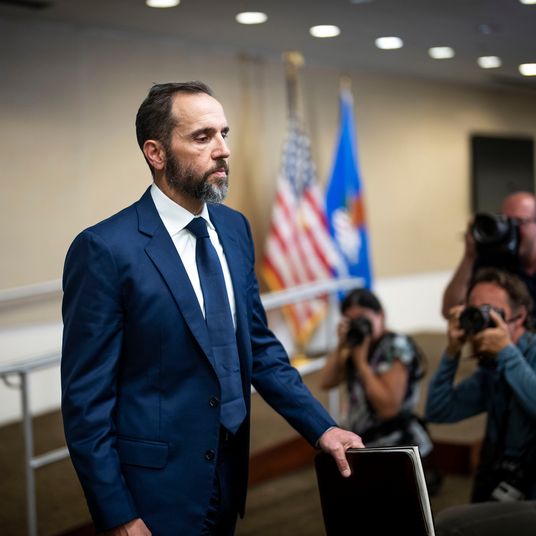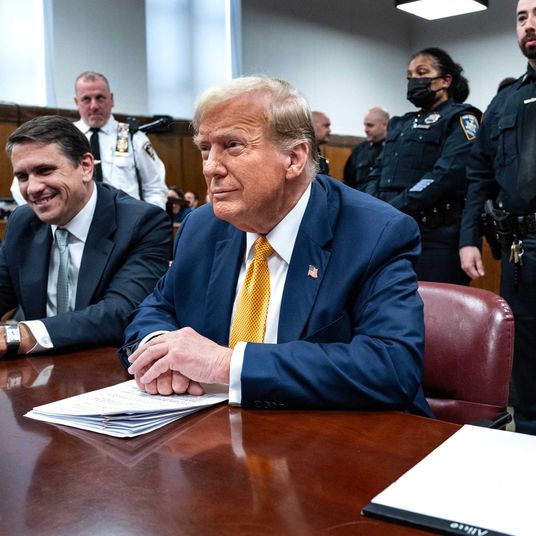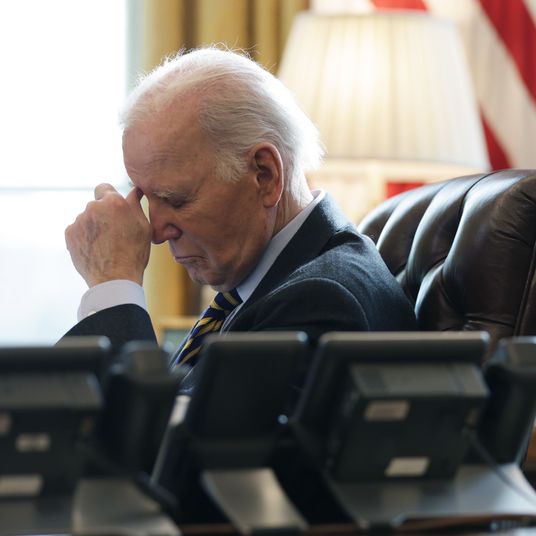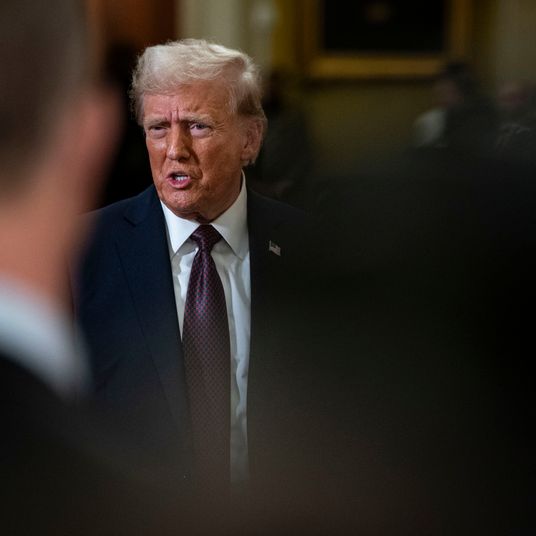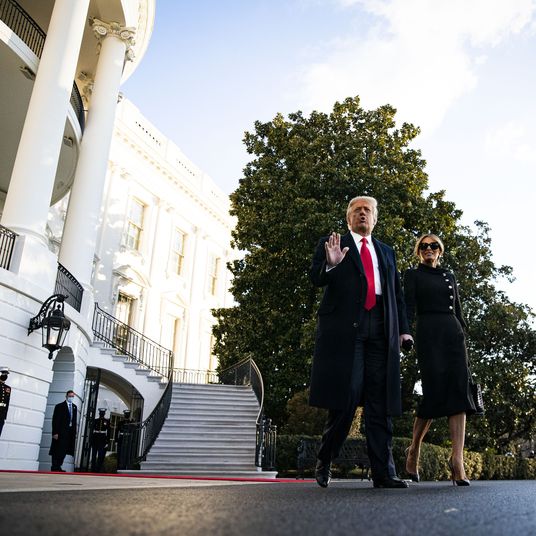
He’s got a shitload of flags, for one.Photo: Getty Images
What is it about John McCain? Amid endless war, scandal, and financial turmoil delivered by a Republican administration, Republicans are likely to lose at least four Senate seats this year, and Republican congressmen are retiring by the bushel. Yet here’s the Republican presidential nominee, having a great stretch in the early run-up to the conventions. He’s not only running even with Barack Obama and Hillary Clinton nationwide but often ahead in key battleground states such as Florida and Ohio. How is that possible? It’s not just because Clinton and Obama are beating each other up.
First, McCain domesticated the crazies. Blitzing New Hampshire and running as dirty a campaign as he needed to win Florida, McCain knocked Mitt Romney out of the race before movement conservatives quite realized what hit them. Rush Limbaugh and Ann Coulter have bitched about McCain, and James Dobson is still squawking. But the far right is nothing if not pragmatic (more so, certainly, than the far left). And conservative elites love George W. Bush’s tax cuts, which they trust McCain to make permanent, as much as they hate open borders, which they don’t trust McCain to close. So just as many leading wingers adored Alan Keyes but voted for Bush in 2000, most have now moved behind McCain. And it may be a pox on the media that the endorsements McCain got from John Hagee and Rod Parsley didn’t get more attention. Politically, though, their meaning was clear: The virulent pastors were also kowtowing to McCain.
Then the Jeremiah Wright blowup triggered a shift away from the Democrats among precisely the kinds of voters McCain needs to win the general election. The specific effect depends on the opponent McCain draws. Against Obama, he attracts a chunk of conservative Democrats, according to Gallup’s latest numbers. And he keeps solid hold of the small-town conservatives and right-leaning Independents who had flickered toward the upstart senator. Against Hillary, McCain makes his greatest inroads among Independents and liberal and moderate Republicans, who are increasingly turned off by her partisan and polarizing campaign. But if you add either group of defectors to McCain’s support among conservative Republicans (now more than 90 percent) and Hispanics (still about 35 percent), you get an electoral map that looks a lot more like 2000 or 2004 than the realigned Democratic landscape that seemed possible six months ago.
Moreover, the worse George W. Bush does, the better McCain looks. McCain is walking a tightrope by supporting so many unpopular Bush policies while claiming he would execute them better — he’d make the Bush tax cuts permanent but somehow make spending cuts, too; he’d stay in Iraq but somehow win the damn thing. As a result, Democratic strategists are deriding him as running for Bush’s third term. But for many voters, there’s some plausibility to McCain’s implicit argument that more than an ideological change at the top, the country needs a grown-up in charge. Particularly over the past week: As Bush haplessly called the Basra fiasco a “turning point,” McCain was talking about how “only a fool or a fraud sentimentalizes the merciless reality of war.”
Finally, McCain has been allowed to define himself essentially without contradiction for about two months now. Mike Huckabee tossed bouquets his way before finally dropping out. Hillary conceded McCain’s commander-in-chief bona fides in order to knife Obama, and Bill Clinton talked up McCain’s love of country. Obama would love to be saturating the nation with general-election ads, the way Bill Clinton nuked Bob Dole in the months before the 1996 conventions, but he can’t get around to that just yet. And if you want to see how the press covers McCain, rewatch MSNBC’s March 5 primary coverage. For no apparent reason, around 10:20 Eastern time, Brian Williams began talking about how Democrats should heed well the lessons McCain learned as a POW. That kind of man-love is all too typical among the political media, who are gaga for McCain the way sportswriters were for Brett Favre or Pete Rose, as the wisecracking tough guy who gives the game all he’s got. The Times ran half a dozen dissections of Rudy Giuliani while he was still a viable candidate. The Boston Globe exhumed every detail of John Kerry’s past it could dig up in 2004. But nobody’s going CSI on McCain.
There’s a genuine background affection for McCain out there in the ether, too. During all these weeks without meaningful voting, intra-Republican fighting has receded, and when McCain has been able to elbow past the Democrats into the news, his humor and long record of public service have reemerged. McCain’s spontaneous mocking of David Letterman’s hands-in-pockets posture was even funnier than the insults he dropped the other night, and is the kind of thing that’s reminding voters and pundits of the guy they came to like in 2000 — and who was the most popular politician in the country until September 2001. And McCain’s biography tour is implicitly telling the country that if we’re sick of baby-boomer entitlement, we don’t have to turn to Obama; we have one last chance to trust an earlier generation’s sense of honor.
The McCain boomlet may well start to deflate as soon as the Democrats settle on their nominee. But for the moment, the old guy has earned the spring in his step. —Peter Keating
For a complete and regularly updated guide to presidential candidates Hillary Clinton, Barack Obama, and John McCain — from First Love to Most Embarrassing Gaffe — read the 2008 Electopedia.





